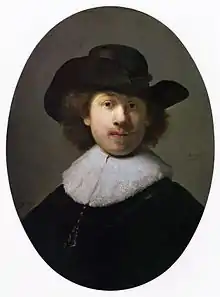Wideawake hat
A wideawake hat is a broad brimmed felt "countryman's hat" with a low crown, similar to a slouch hat. A wideawake hat is most commonly seen in dark shades of cloth, such as dark brown or black felt. The brim is fairly wide, and is flat in front and back but with a moderate upturn on the left and right slides. The brim may be asymmetric from side to side, as seen in the Rembrandt portrait, or symmetrical, as seen in the Quaker Oats logo. If asymmetric, it is more similar to a slouch hat, which has one side pinned to the crown and the other side allowed to droop.[1] The top is styled flatly, rather than in a bowler curve. A hatband at the base is common.[2]
History and portrayals
The best-known portrayals of a wideawake hat are in two self-portraits by Rembrandt from 1632.


In the United States, wideawake hats have also been known as "Quaker hats", after their adoption by Quakers in the 17th century. A well-known depiction of this style is part of the logo for Quaker oats. It was also associated with the Wide Awake Party, an abolitionist Republican Party affiliate organization in the 1860s in the United States.[3]
The hat gained in popularity in the Victorian era,[4] and was adopted as part of the dress uniform for some British boy scouting organizations.[5][4] Alfred Tennyson was photographed in a wideawake hat.[6]
References
- "NZ Slouch". Digger History. Archived from the original on 20 September 2010. Retrieved 1 August 2010.
- "Wideawake hat", HatGuide, last visited July 31, 2020.
- See, for example, the "1860s Bollman Collection Wide Awake" (last visited July 31, 2020).
- Ellie Hughes, "What Does Your Hat Say About You?", Country Life, Oct. 23, 2015.
- Scouting for Boys, Robert Baden-Powell (1908).
- "The wide-awake, a broad-brimmed felt hat with a lowish crown, was a, countryman's hat, but there are photographs of Alfred Tennyson looking extremely impressive in one in the 1850s." Joan Nunn,"Victorian Men's Fashions, 1850-1900: Hats", in Fashion in Costume, 1200-2000, 2nd ed., A & C Black Ltd, and New Amsterdam Books, Chicago, 2000 (available at VictorianWeb.)